Struggling with the misfortune of others
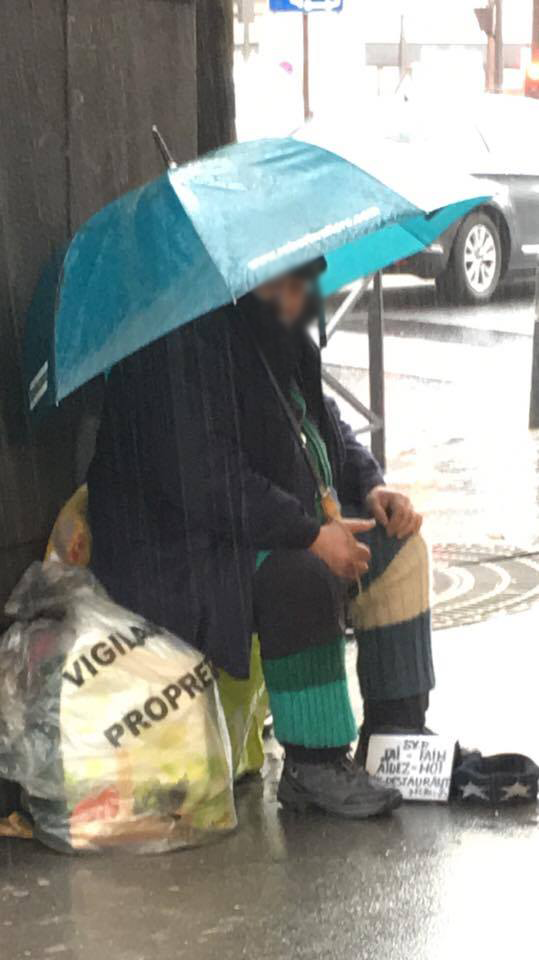
Paris. A city so beautiful from afar. The streets are vibrant, the culture is rich, its people are proud and the architecture is unforgettable. However, if you choose to look past its magnificent façade, Paris reveals another side of humanity, writes Isaac Nowroozi.

When I first arrived in Paris, I was blind to its poverty. I was immersed in its beauty and overwhelmed by its vast culture. I was a long way from Canberra.
Two weeks passed by and I had ticked off the major tourist attractions, passing from one museum, church or patisserie to another. I decided I wanted to ‘really experience’ the city of lights, to wander and become a true Parisian.
One Saturday I decided against another Uber and walked down Rue de Passy in the 16th arrondissement. Passy is a stately high-class neighbourhood, spoiled with boulangeries, bistros and high-end shopping.
The entire area is overlooked by the Eiffel Tower, peeking above each stately apartment building. It’s impossible to find a more French skyline.
I turned to enter Passy metro station and, as I scanned my ticket to get inside, a foul stench hit me like a punch in the face.
“It smells like cat piss in here,” as one American tourist so eloquently put it.
It was the first time I really missed home.
The smell of urine is not one that I was used to, but everyone else in the metro didn’t seem to mind.
The people on the metro looked respectable. They were clean, well-dressed and attractive.
If you saw these people on the soon-to-be built light rail, you would think they were public servants on their daily commute or just some kids on their way to university.
After realising that I was on the wrong metro, I eventually found my way to my destination, another Paris hotspot: Avenue des Champs-Élysées.
Walking down this iconic avenue, you see the Arc de Triomphe towering in front of you, the focal point of one of Paris’ most vibrant districts.

I walked past two matte black Lamborghini Gallardo’s, parked adjacent to a Louis Vuitton store filled with abstract art and security staff. Outside the store, there was a red carpet with a crowd of people eagerly awaiting entry.
It smelt a lot better here. The air was fresh, and left me buzzing with excitement.
I took five steps past the Louis Vuitton store, and my excitement levels went from 100 to 0 faster than the Lamborghini behind me could to do the opposite.
Seated on the cold concrete, leaning on the glass windows of the store with nothing but an old blanket to separate them from the winter afternoon, was a family of four. They looked like refugees, but could have been from anywhere. The world had forgotten them.
Keep walking down the avenue, and you see family after family, small children hunched over and lifeless with nothing but an empty Starbucks cup in front of them.
Pregnant women bowed at every crossing, cardboard signs propped on their laps.
I felt disgusted. The disparity was stark. How can some people have so much, yet others have nothing?
The wealth gap was like nothing I had ever witnessed and the reality of what the world is really like hit me in a way I had never felt before.
The city of lights for some was a city of darkness for others. But no one else seemed to mind.
When I returned to Canberra I went for a walk around Civic. I passed by the Griffith Centre, Academy nightclub and Casino Canberra.
These were the spots where I remembered seeing the homeless, and they were still there. There were middle-aged men in swags, lying on tarpaulins.
However, seeing these people didn’t elicit the same emotional, knee-jerk response.
Seeing those children and families in Paris left me with an emptiness I struggled to process.
I don’t remember how I felt when I saw my first ever homeless person in Canberra, but I will never forget seeing it Paris.
After my long, eye-opening walk, it felt as though there were homeless and struggling people everywhere I looked. They were suddenly hyper-visible.
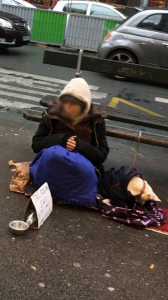
From elderly women begging in the streets to groups of African men selling miniature Eiffel Towers, they were everywhere, and my heart broke for all of them.
It didn’t hit me why I felt so sorry for everyone until I thought about why didn’t feel the same way about the homeless in Canberra.
Being homeless in Paris felt like it could happen to anyone, and once they got to that stage in a place so unforgiving, it seemed as though the world had turned its back on them.
Further, it was the way in which they were treated. People treated them as if they were invisible, like they didn’t exist.
In Trocadero, the tourist hotspot for selfies with an Eiffel Tower backdrop, I walked past the same disabled man every day. He would shake and convulse, murmuring to each person who passed by.
I saw people walk past young children begging and not bat an eye.
In Canberra, if a disabled person or a child was sitting in the city all day begging for money, they would be helped by someone, if not a citizen, then a police officer.
It felt like I was the only person who looked twice, who responded to these people sitting feet away. But in a city filled with people from all over the world, could I be the only person who realised how sheltered I really was in my own city?
Elisabeth, 22, moved to Paris from Canberra, and has been working there for the past five months. For her, seeing so many people on the street was a humbling experience.
“It made me realise how sheltered we are in Canberra, and Australia more generally,” said Elisabeth.
“We rarely see poverty so clearly and so frequently. It was such an abstract concept for me before.”
Elisabeth made an effort to try to accept her surroundings, in order to allow herself to go about her own life.
“I have become desensitised, and, in a way, consciously so,” she said. “I try to block it out so that I can actually get to the supermarket, or to work or home again.
“It feels impossible for me to function as a human being while being sensitised to everything terrible or confronting that goes on around us.”
However, this approach has forced her to re-evaluate her own mindset. On the one hand she is able to justify her thought process, yet on the other, she remains conflicted with being able to do so.
“If I allowed myself to worry about each homeless person I passed every day, I would never achieve anything else,” she said.
“I am starting to worry about what that says about me? Should it be that easy to block these things out?”
32-year-old Jeff has a different perspective. Jeff, who grew up in suburban Washington DC in the United States, prefers not to compare the situations of homeless people.
“If you look at vulnerable populations in general in society, homelessness will only exacerbate pre-existing vulnerability,” he said.
Jeff still feels sorry for the struggling people he comes across, but instead of allowing himself to dwell on the misery of the less fortunate, he puts his own life into perspective and truly appreciates everything he has.
“I feel fortunate. We live in a culture that encourages people to always want more, such as higher income, a bigger home or the latest technology,” he said. “When, in reality, we should feel grateful that our basic needs are being met.”
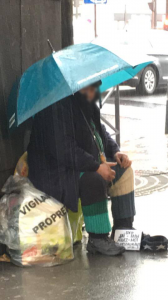
and wearing his multi-coloured pants.
Linda, 33, came to Paris from London, and was shocked about seeing “that many homeless people”.
Her feelings were similar to my own, in that intervention was more common practice where she was from.
“In London the authorities are more proactive about providing assistance to homeless people, particularly in light of sex trafficking concerns,” said Linda.
“I felt as though the government was more interventionist when it came to homelessness. They assume a sense of duty and are judged by their capacity to help the vulnerable.”
However, her feelings when she sees homeless people differ to my own.
“When I walk past a homeless person, I feel sad, then I feel apprehensive,” she said.
“This may be because homeless people are often associated with drug use. However, I understand that homelessness can happen to anybody. It is not something that someone chooses or is necessarily because of their poor choices. It is rather that people get trapped in a cycle that they can’t get out of.”
Linda’s answer stuck with me.
If I had looked at the homeless people, and convinced myself that they were there of their own accord, or had some other agenda, would I have put this much thought into their situation?
It made me realise that this is what I have done my whole life at home. When I see homeless people, I prefer to assume that they have help, or maybe, on some level, are content with their lives. That they have refused help or are beyond society’s reach.
I tell myself that if I ever saw a family on the street, especially young children, it would only be a matter of time before they were helped out and given a fighting a chance in life.
But the truth is I don’t really know their situations, no one does, and I never ask.
I don’t know how any of them, young or old, got to the position they are in. Choosing to think that these people are trapped in a cycle is as plausible as choosing to think that they are victims of poor circumstances rather than poor choices.
So naturally I choose to believe the answer that makes me feel better about myself and the circumstances that I am in.
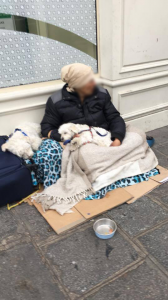
I concluded my interviews by asking each person: “What do you think homeless people think about us?”
Elisabeth believes they look at her and see someone “who is very lucky” and she hopes that, on some level, they understand her.
Jeff wasn’t sure, and speculated that depending on the person, they could feel angry and bitter, or hopeful.
Linda doesn’t believe that they think about her at all, or any of us.
“Many are trying to ensure their survival,” she said. “I don’t think they particularly think of me – it is not personal.”
I, on the other hand, can only try and put myself in their shoes and wonder what I would think of me.
If I was sitting outside a store where people were buying one article of clothing worth more money than I would know what to do with, then I would feel bitter. It would make me hate the world, and those people.
But mostly, I would lose hope, as it would make me feel forgotten. If I felt insignificant in Paris now, I would feel non-existent then.
However, if I was homeless in Canberra, I don’t think I’d have hate in my heart, and I certainly believe that there would be hope for me, just as I believe there is for those on the Canberra streets now.


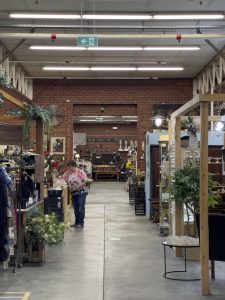


Be the first to comment!